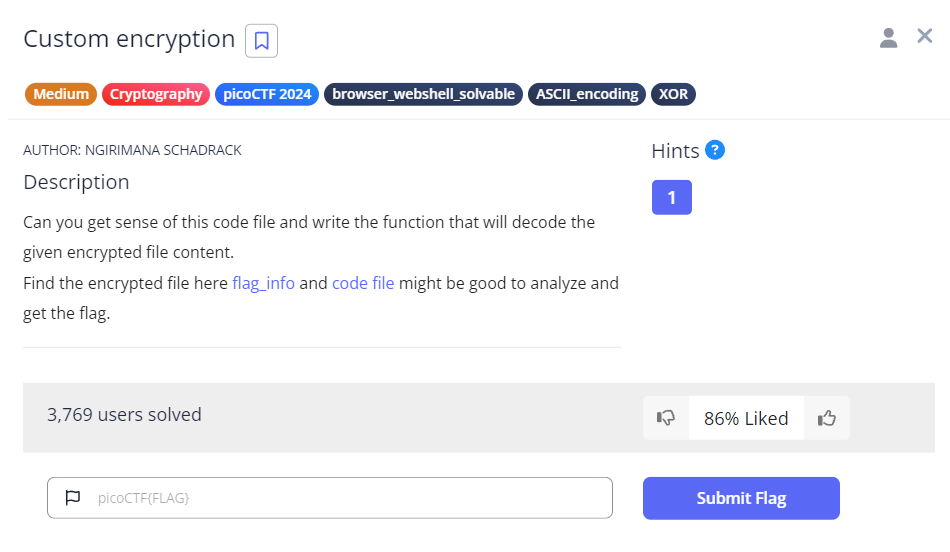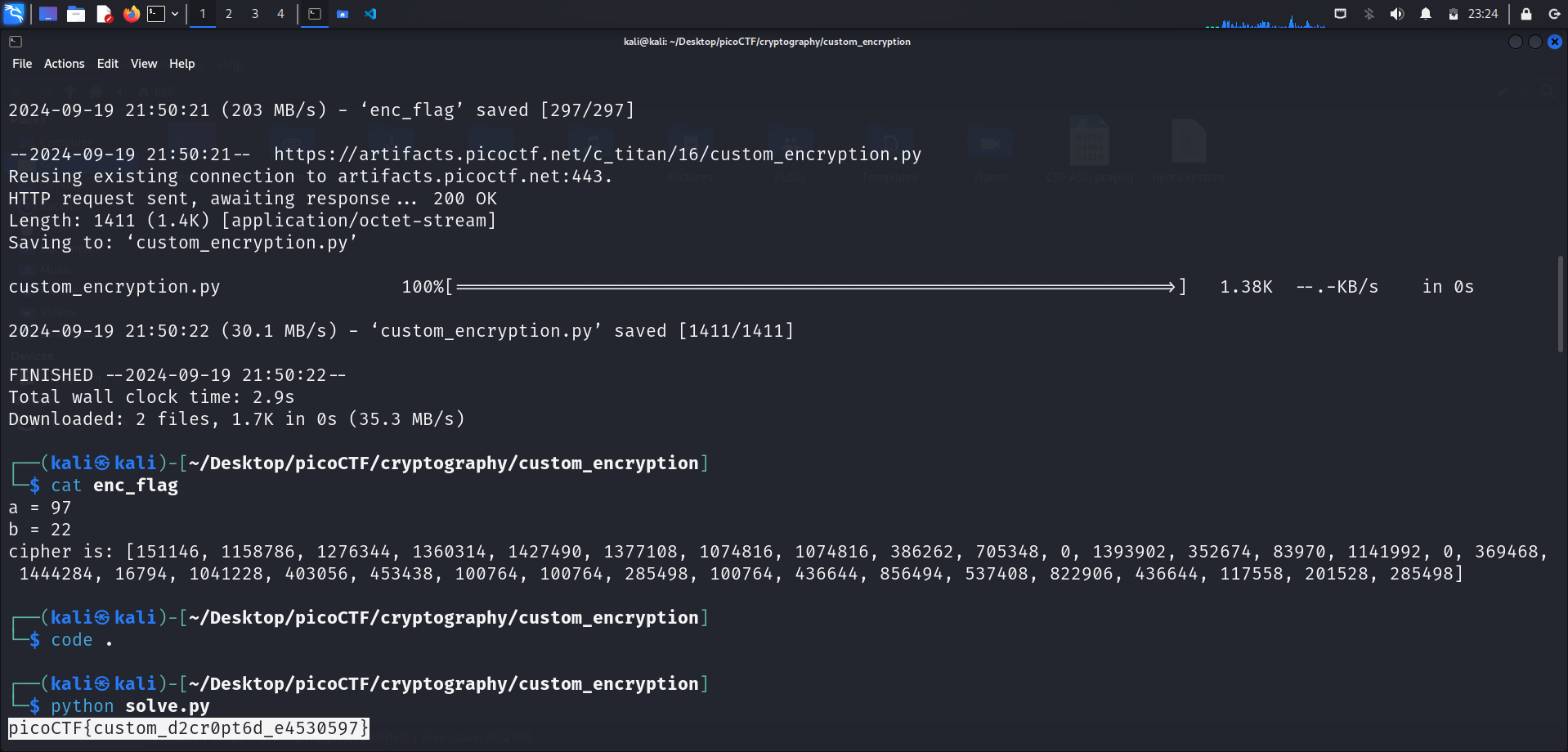Challenge Description

In this challenge, we will attempt to decode the contents of the given file that has been encrypted with a Python script.
We first begin by downloading the 2 files, enc_flag and custom_encryption.py, by running wget <link1> <link2>.

I proceeding to use cat to display the contents of enc_flag file:
a = 97
b = 22
cipher is: [151146, 1158786, 1276344, 1360314, 1427490, 1377108, 1074816, 1074816, 386262, 705348, 0, 1393902, 352674, 83970, 1141992, 0, 369468, 1444284, 16794, 1041228, 403056, 453438, 100764, 100764, 285498, 100764, 436644, 856494, 537408, 822906, 436644, 117558, 201528, 285498]
We see that there are 2 variables given, a and b. There’s also a list of seemingly random numbers.
To understand the contents of this file, we need to check the Python script provided, which I’ve included below as well:
from random import randint
import sys
def generator(g, x, p):
return pow(g, x) % p
def encrypt(plaintext, key):
cipher = []
for char in plaintext:
cipher.append(((ord(char) * key*311)))
return cipher
def is_prime(p):
v = 0
for i in range(2, p + 1):
if p % i == 0:
v = v + 1
if v > 1:
return False
else:
return True
def dynamic_xor_encrypt(plaintext, text_key):
cipher_text = ""
key_length = len(text_key)
for i, char in enumerate(plaintext[::-1]):
key_char = text_key[i % key_length]
encrypted_char = chr(ord(char) ^ ord(key_char))
cipher_text += encrypted_char
return cipher_text
def test(plain_text, text_key):
p = 97
g = 31
if not is_prime(p) and not is_prime(g):
print("Enter prime numbers")
return
a = randint(p-10, p)
b = randint(g-10, g)
print(f"a = {a}")
print(f"b = {b}")
u = generator(g, a, p)
v = generator(g, b, p)
key = generator(v, a, p)
b_key = generator(u, b, p)
shared_key = None
if key == b_key:
shared_key = key
else:
print("Invalid key")
return
semi_cipher = dynamic_xor_encrypt(plain_text, text_key)
cipher = encrypt(semi_cipher, shared_key)
print(f'cipher is: {cipher}')
if __name__ == "__main__":
message = sys.argv[1]
test(message, "trudeau")
There are a total of 5 functions used to encrypt the original flag. After reading the code, we will understand why the values of a and b were given. It’s because a and b are random values between 87 - 97 and 21 - 31 respectively.
We are also given the list of numbers named “cipher” as we will need to do some reverse-engineering using these values to find the original flag.
To decode the encrypted file contents of enc_flag, I wrote this Python script:
'''
p = 97
g = 31
a = 97 (random number from p-10 to p, both included)
b = 22 (random number from g-10 to g, both included)
u = g^a mod p
u = 31
v = g^b mod p
v = 54
key = v^a mod p
key = 54
b_key = u^b mod p
b_key = 54
So, shared_key = key = b_key = 54
semi_cipher = dynamic_xor_encrypt(flag, "trudeau")
cipher = encrypt(semi_cipher, shared_key)
'''
cipher = [151146, 1158786, 1276344, 1360314, 1427490, 1377108, 1074816, 1074816, 386262, 705348, 0,
1393902, 352674, 83970, 1141992, 0, 369468, 1444284, 16794, 1041228, 403056, 453438, 100764,
100764, 285498, 100764, 436644, 856494, 537408, 822906, 436644, 117558, 201528, 285498]
def decrypt_semi_flag(key):
semi_flag = ""
for chr_cipher in cipher:
x = chr(chr_cipher // (key*311))
semi_flag += x
return semi_flag
def dynamic_xor_decrypt(semi_flag, key):
flag = ""
key_length = len(key)
for i, char in enumerate(semi_flag):
key_char = key[i % key_length]
decrypted_char = chr(ord(char) ^ ord(key_char))
flag += decrypted_char
return flag
semi_flag = decrypt_semi_flag(54)
flag = dynamic_xor_decrypt(semi_flag, "trudeau")
print(flag[::-1]) # unreverse the flagRunning this script allows us to retrieve the flag.
Flag
picoCTF{custom_d2cr0pt6d_e4530597}